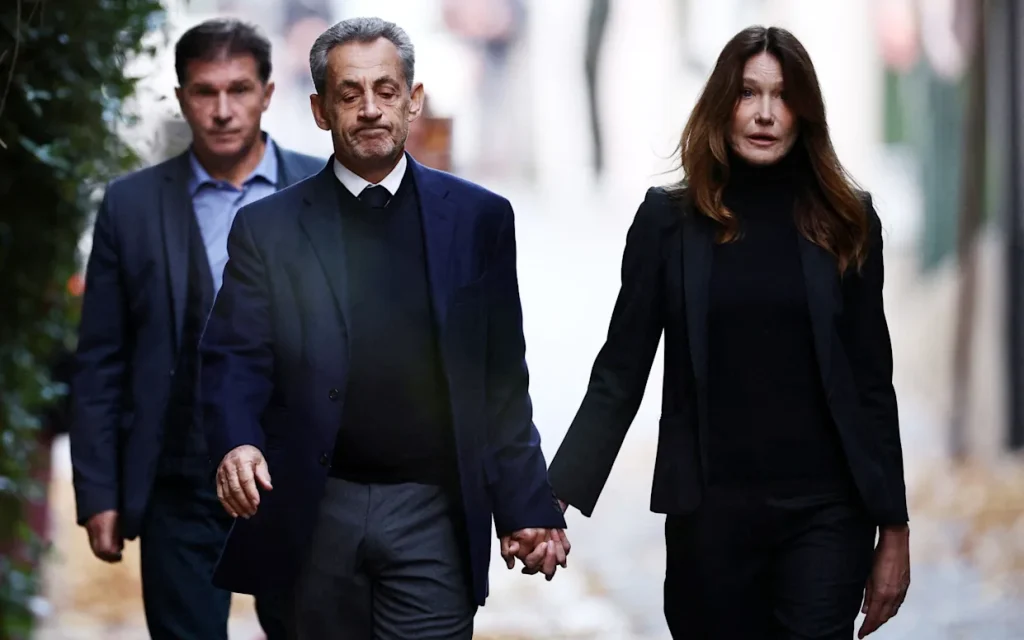
In a historic moment for French and European politics, former French President Nicolas Sarkozy began his five-year prison sentence on Tuesday, asserting his innocence as he entered La Santé prison in Paris. Sarkozy, who led France from 2007 to 2012, is the first former head of an EU state to be incarcerated, marking an unprecedented event in modern European history.
Sarkozy Leaves Home Amid Supporters’ Applause
AFP and Reuters journalists observed the 70-year-old former president leaving his Paris residence hand-in-hand with his wife, singer Carla Bruni. He was escorted by a motorbike police convoy to the prison, where he will likely serve time in solitary confinement to avoid contact with other inmates.
Dozens of supporters gathered outside his home, holding framed portraits and singing the French national anthem. Chants of “Nicolas, Nicolas! Free Nicolas” filled the streets, while neighbors looked on from balconies. Sarkozy appeared composed, kissing Bruni before entering the car, reflecting a calm demeanor amid the historic moment.
Historic Context and Legal Background
Sarkozy’s conviction stems from the so-called “Libyan case”, in which prosecutors argued that his aides, acting on his behalf, negotiated a deal with Muammar Gaddafi in 2005 to illegally fund his victorious 2007 presidential campaign. Investigators believe Gaddafi expected assistance in restoring Libya’s international image following the 1988 Lockerbie bombing and the 1989 Niger attacks.
While Sarkozy was found guilty of criminal conspiracy, the court did not determine that he personally received or spent the funds. He was acquitted of embezzling Libyan public funds, passive corruption, and illicit campaign financing.
After the September 25 verdict, Sarkozy remarked, “If they absolutely want me to sleep in prison, I will sleep in prison — but with my head held high.” He is taking a biography of Jesus and a copy of The Count of Monte Cristo, a novel about an innocent man imprisoned but seeking justice.
Solitary Confinement at La Santé
Sarkozy will likely reside in a nine-square-metre (95-square-foot) cell in La Santé’s solitary wing. Prison rules allow inmates one walk per day in a small yard, alone, and up to three weekly visits. The presiding judge, Nathalie Gavarino, emphasized the “exceptional gravity” of his offenses, ordering incarceration even pending appeal.
His legal team has already filed a request for release pending appeal. The Paris appeals court has two months to examine the request, though decisions are often rendered more quickly. Sarkozy could remain in prison for at least three weeks to a month before any ruling is issued.
Previous Convictions and Ongoing Legal Challenges
Sarkozy has faced multiple legal challenges since losing his re-election bid in 2012. He previously served house arrest for a graft conviction while wearing an electronic ankle tag, removed after several months in May. Additionally, he faces an ongoing case involving alleged illegal financing of his 2012 campaign.
He was also stripped of France’s highest honor, the Legion of Honour, following the graft conviction. Despite these legal setbacks, Sarkozy maintains support among France’s right-wing voters and has held private meetings with President Emmanuel Macron, who defended hosting Sarkozy at the Elysee Palace, describing it as “normal, on a human level, for me to receive one of my predecessors in this context.”
Public Opinion and Political Significance
A recent survey by pollster Elabe found that six out of ten French citizens consider the prison sentence fair. Sarkozy’s incarceration represents a landmark moment in French democracy, holding former leaders accountable under the law. He is also the first French leader imprisoned since Philippe Pétain, the World War II-era collaborationist head of state.
La Santé prison has previously held notorious inmates, including Ilich Ramirez Sanchez, also known as Carlos the Jackal, underscoring the facility’s historical significance in housing high-profile prisoners.
The Road Ahead
Sarkozy’s imprisonment has captivated France and the world, symbolizing the intersection of politics, accountability, and justice. As his appeal process unfolds, international observers will monitor the case closely, recognizing its implications for political integrity and the precedent it sets for holding former leaders responsible for misconduct.


Leave a Reply